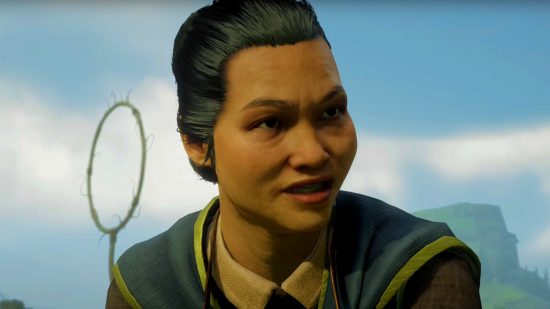When I take a moment to sit down and really think about what makes an open world RPG excellent, what actually makes these expansive experiences tick, I think about breathtaking vistas, dense environments, clever quest design, and engaging characters. These are all things that Hogwarts Legacy actually does quite well – for the most part. However, there’s one aspect of great open world games that this Harry Potter game is missing out on, an oversight that is detrimental to the Wizarding World experience it’s offering players, and that is Avalanche Software’s use (or should I say, misuse) of mini games.
In Hogwarts Legacy, there are three activities that are perfect mini game material. You can challenge a handful of students and Professor Ronen to a game of Summoner’s Court, there are three broomstick time trial courses to complete, and you can go toe-to-toe with Hogwarts’ best duelists to become the school’s Crossed Wands champion.
To the developer’s credit, these activities all add to the experience on offer and breathe life into an otherwise dull open world outside of main missions and side quests – which you can read more about in our Hogwarts Legacy review here. However, unlike other popular open world games like The Witcher 3 Wild Hunt, Horizon Forbidden West, and Red Dead Redemption 2, Hogwarts Legacy’s extra-curricular activities are classified as side quests – attributed the same value as finding Zenobia’s lost Gobstones around Hogwarts Castle or recovering some dangerous Venomous Tentacular for Duncan Hobhouse.
While this does mean you’re rewarded for each game of Summoner’s Court you win, for example, it does also mean that you’re limited to a finite number of games. There are only a handful of people for you to beat before the Summoner’s Court board gets packed away, never to be seen again.
Similarly, once you become Crossed Wands champion, no one wants to duel you anymore, which we suppose is somewhat understandable – even if Leander Prewett talks the big talk when you challenge him. You can repeat the broomstick time trials organised by Imelda Reyes, but there’s only so many times you can run the same three courses before you know them like the back of your broom.
I know there are quite a few areas where this game needs to improve, like the implementation of some of this game’s most useful tools, but Avalanche Software’s decision to restrict the amount of times each player can actually play these fully functioning – and rather enjoyable – experiences makes no sense. The fact these are not proper, repeatable mini games is a proper disappointment.
Sure, I can’t imagine anyone would want to spend a hundred hours or more playing Summoner’s Court; that doesn’t mean I wouldn’t like to have the option to play it as and when I’d like to. When you think about the fantastic job Avalanche Software has done when it comes to immersing players into the Wizarding World through Hogwarts Legacy’s environment and the interactions going on around you, it seems like something of a step backwards to then limit the more interactive elements of this immersive experience in an open world game.

This isn’t just an oversight, though, but something that is indicative of a wider problem facing Hogwarts Legacy. The open world presented to players is superficially immersive and Avalanche Software is wasting the potential the Wizarding World offers.
For example, Wizard Chess – a cosmetically magical variation of standard chess – is only mentioned in reference less than a handful of times in Hogwarts Legacy. I can’t imagine it’s easy to introduce the mechanics of chess to an open world action-RPG, but you have to wonder why something like this – a staple in the Wizarding World – wasn’t included in Hogwarts Legacy.
And, of course, there’s Quidditch. This broom-based sport’s absence is a disappointment. However, when you look objectively at the control scheme implemented by Avalanche Software when it comes to broomstick flight, it’s hard to imagine how adding mechanics like bludger-beating, throwing, catching, and keeper’s defensive manoeuvres would work in practice. So, while it is a shame that this is missing, it’s understandable given the current state of the game.
Whether it’s Machine Strike in Horizon Forbidden West, Liar’s Dice and Dominoes in Red Dead Redemption 2, Tennis and Golf in Grand Theft Auto V, Orlog in Assassin’s Creed Valhalla, or the indomitable Gwent from The Witcher 3 Wild Hunt, all the best RPG games out there make excellent use of mini games sprinkled throughout their open worlds to elevate the experience on offer. Hogwarts Legacy fails to do this, and it’s truly a waste of the source material.
Hogwarts Legacy has drawn considerable criticism during its development, largely due to the fact that the creator of the Harry Potter series, J.K. Rowling, has made a number of transphobic remarks on social media in recent years.
While Avalanche has confirmed that J.K. Rowling is not “directly involved” in the development of Hogwarts Legacy, it is working with “her team” and Portkey Games, a Warner Bros. label dedicated to launching new experiences inspired by J.K. Rowling’s original stories. It is currently unclear whether she will earn any royalties from the game’s sale, but it is likely given it is based on her original body of work.
If you would like to learn more about transgender rights or lend your support, we’d encourage you to check out the National Center for Transgender Equality in the US and Mermaids in the UK.
